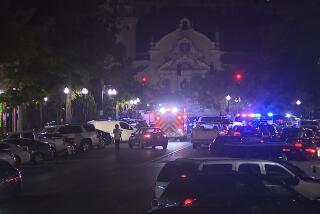Reward payouts rare in homicide cases, but potential keeps offers coming
- Share via
How effective are the rewards offered in homicide cases? Payouts are rare, but detectives say they still believe in them, and politicians continue to approve them.
In the LAPD’s latest reward announcement, $50,000 was offered Thursday for information in the shooting death of Moses Nelson, a 32-year-old father of three who was gunned down by an assailant on a bike in November.
It is the third reward announced this month for tips in homicide cases. On Feb. 5, $50,000 was offered in the case of Antonia “Toni” Yager, who was stabbed in December inside her home near Larchmont Village. A day later, the city and the Police Department announced $75,000 for information in the killing of Bert Crump Jr., 17, who was shot Aug. 22 in Vermont-Slauson by a gunman on a bike.
In the Nelson case, an image of the bike-riding gunman was captured on video.
“Other than that, our leads kind of ran dry,” LAPD Det. Leonardo McKenzie told a room of TV cameras and reporters Thursday morning.
That’s when investigators may turn to the public for help.
“We get some of these that are complete whodunits,” said LAPD Det. Richard Arciniega, who is investigating the Nelson case.
Still, in 16 years of working homicide, he said, he’s paid out rewards only twice. In many cases, rewards come with the caveat that the information must yield results.
Arciniega said he hasn’t lost faith that money could motivate witnesses.
“Fifty thousand dollars to a lot of people is a lot of money,” Arciniega said. The money, he added, can help someone leave a rough neighborhood.
In Los Angeles, a reward typically starts with the investigating detective, who puts in a request to the City Council. Detectives say the victim doesn’t have to be one whose case generates significant attention or to have been killed in a posh part of town. The reward amounts vary depending on the circumstances, and the council usually approves the request.
“As an elected official, if you’ve got this tool in your toolbox, why not use it?” said Connie Llanos, a spokeswoman for Councilman Curren Price, in whose district Nelson was killed.
Sometimes, a news conference is held to announce the reward. If authorities have additional evidence, such as video or a sketch, they may release it in conjunction with the reward offer.
In the Crump killing, police released footage of a man on a bike who is believed to have been the shooter. In the video, Crump runs through a neighborhood, followed closely by the bicycle rider.
“To see my son running for his life like that, it just broke my heart all over again,” Tawona Lee, Bert Crump’s mother, said. “I know my son didn’t deserve to die like that.”
In the days after the shooting, LAPD Det. Eric Crosson and his partner walked the streets near Raymond and West Gage avenues and even stopped traffic to pass out fliers. But it wasn’t enough to get a viable lead.
In seven years of investigating homicides in South L.A., Crosson said, he’s never paid out a reward. But he still uses them.
“Even if we reach that one person who sees it,” he said, “it’s worth it.”
Crump, who was visiting his grandmother shortly before the killing, didn’t have any gang ties. He didn’t live in the area. Police believe he could have been shot because of where he was — the intersection of two gang territories — and the color of his T-shirt, red.
The reward in Crump’s killing is higher, $75,000, because when Crump was trying to run away from the gunman, he jumped into a 73-year-old man’s car and asked him to go faster. The man was also injured and briefly hospitalized.
For a grieving family, a reward can bring hope.
“Without that, I don’t think anybody will stand up and say what happened to my son,” Lee said. “With a reward, it’s a real big help.”
More to Read
Sign up for Essential California
The most important California stories and recommendations in your inbox every morning.
You may occasionally receive promotional content from the Los Angeles Times.











